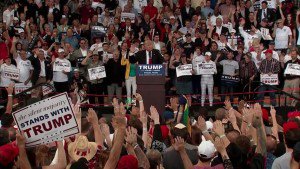


03/29/2016
See, earlier by Kevin McDonald: Why So Much Jewish Fear And Loathing Of Donald Trump? and Jewish Fear And Loathing Of Donald Trump [2]: “New York Values” vs. Muslim Immigration
Donald J. Trump’s speech last week to the American Israel Public Affairs Committee [AIPAC] went astonishingly well. Once again Trump showed excellent political instincts, effectively attacking Obama and Clinton as insufficiently pro-Israel. [11 times Donald Trump won the AIPAC conference, by Ron Kampeas, JTA.org, March 21 2016] As a Trump supporter critical of the role of Israel in U.S. politics, I wrote off his pandering (softening his position on “neutrality” in brokering Israeli-Palestinian peace and on Jerusalem as Israel’s capital) as a marker of Jewish power and kept reminding myself that Trump — uniquely among the candidates — has made many sensible comments on Middle East policy, including especially condemning the Iraq war and US policy in Syria.
But the controversy over Donald Trump among American Jews rages on. (In fact the walkout at Breitbart over Trump campaign manager Corey Lewandowski’s alleged rough handling of reporter Michelle Fields — for which he has now, rather remarkably, been charged — seems to be driven at least in part by a Jewish anti-Trump faction).
It’s at the point now where the Hitler comparisons and over-the-top Op-Eds are literally too numerous list. As The Daily Beast’s Matt Wilstein wrote March 11, “this was the week that it became utterly acceptable to compare Donald Trump to Hitler.” [Sarah Silverman’s Adolf Hitler Rejects Trump Comparisons on ‘Conan’].

Front page of Mort Zuckerman’s New York Daily News, March 6, 2016
But of course, that’s how the Main Stream Media has always worked: repetition, repetition, repetition — the hoped-for result being the creation of “Trump = Hitler,” “Trump = racist,” psychological reflexes that will engender guilt in enough voters to sway the election.
Abe Foxman, although no longer head of the Anti-Defamation League, continues to show the hair-trigger anti-Trump reflexes of the activist Jewish community. Thus at a rally in Florida, Trump simply asked the crowd to raise their hands if they intended to vote for him. So lots of people raised their hands in all sorts of ways, some outstretched, some with crooked elbow — the latter including Trump himself.
Obviously, if Trump really wanted to channel Hitler, he could have come up with a much better imitation. But all this was too much for Foxman:
“As a Jew who survived the Holocaust, to see an audience of thousands of people raising their hands in what looks like the ‘Heil Hitler’ salute is about as offensive, obnoxious and disgusting as anything I thought I would ever witness in the United States of America,” he told The Times of Israel.
“We’ve seen this sort of thing at rallies of neo-Nazis. We’ve seen it at rallies of white supremacists. But to see it at a rally for a legitimate candidate for the presidency of the United States is outrageous.”

Foxman is absolutely positive that Trump was well aware that he was tapping into the latent Nazism of the crowd, because, as every American knows, raising your hand in a big crowd can only mean only one thing:
“It is a fascist gesture,” Foxman said. “He is smart enough — he always tells us how smart he is — to know the images that this evokes. Instead of asking his audience to pledge allegiance to the United States of America, which in itself would be a little bizarre, he’s asking them to swear allegiance to him.”
Ex-ADL Chief: Trump’s ‘raise-your-hand’ gambit was deliberate Nazi-style ‘fascist gesture’
By Eric Cortellessa, Times Of Israel, March 7, 2016
Right. Like every candidate ever, Trump wants people to vote for him, and getting them to commit to it by raising their hands is a smart move psychologically because it makes the hand-raiser feel a subtle sense of obligation to carry through with the pledge, which Trump reinforced by saying right after the pledge: "Don’t forget you all raised your hand, you swore. Bad things happen if you don’t live up to what you just did."
Of course, there was a bit of humor here, but also an attempt to inoculate the crowd against the very well-funded ad campaign Trump was enduring. Trump was well aware that, when the crowd went home, they would be deluged with millions of dollars’ worth of anti-Trump ads — ads portraying him, as noted by the New York Times, as a “a liberal, a huckster, and a draft dodger.”[ Money Pours In as Move to Stop Donald Trump Expands, By Matt Flegenheimer and Maggie Haberman, March 6, 2016]
Trump, after labeling the accusation “ridiculous,” said “he would look into ending [the practice]” Maybe a good move, but it certainly won’t stop the “Trump-as-fascist” industry. What really scares activists like Foxman is that they sense that their power to shape public discourse is waning:
“What scares me is he’s broken all these taboos and it’s helped him. … That frightens me. It frightens me that there are all these things that we’ve worked so hard on, but one after another he breaks these taboos and the people applaud him and come back for more.”
And sure enough, Trump won Florida easily, despite Foxman playing the Holocaust victimization card.
New York Times columnist David Brooks, who is usually considered a neoconservative, saw Trump’s tactic the same way on Meet the Press (March 6):
If we're going to get Trump, we might as well get the Nuremberg rallies to go with it. The number one trait that associates or correlates with Trump’s support is authoritarianism, a belief in authoritarian leadership style. [Nazi Card: David Brooks Suggests Trump Staging 'Nuremberg Rallies', By Mark Finkelstein, Media Research Center, March 6, 2016
(Brooks’ comment on authoritarianism have been called into question by a poll described by two political scientists, Wendy Rahn and Eric Oliver. They found that Trump voters are actually populists whose main characteristics are distrust of elites, like Brooks and his employer, and American nationalism — attitudes that make a lot of sense given the themes of Trump’s campaign. [Trump’s voters aren’t authoritarians, new research says. So what are they? Washington Post, March 6, 2016]
Besides the reactions of Jewish organizations, many prominent Jews who have used their media access to assault Trump. In my first article on Trump and the Jews, I noted “We can only imagine the deluge of propaganda if Trump is seen as having a real chance of winning. By comparison, the 1964 ads predicting nuclear Armageddon if Barry Goldwater was elected will be small potatoes.”
And indeed, media critic Howard Kurtz subsequently wrote “Media warnings against Trump shift from aggressive to apocalyptic”. [Fox News, March 8, 2016]
Speaking of apocalyptic, David Brooks, although not representing an official Jewish organization, is certainly a strongly identified Jew with a lofty perch in the elite media. His attack on Trump gave the impression that he searched a thesaurus for every possible negative adjective he could find:
Donald Trump is an affront to basic standards of honesty, virtue and citizenship. He pollutes the atmosphere in which our children are raised. He has already shredded the unspoken rules of political civility that make conversation possible. …
As the founders would have understood, he is a threat to the long and glorious experiment of American self-government. He is precisely the kind of scapegoating, promise-making, fear-driving and deceiving demagogue they feared.[ No, Not Trump, Not Ever, NYT, March 29, 2016]
These last comments clearly refer to Trump’s comments on immigration — the common denominator of Jewish angst.
The theme, over and over again, is that Trump represents opposition to the post-1965 ideology that America should be open to immigration of all peoples and cultures as a moral imperative (often invoking “American values”) without regard to American interests — often with reminders that the immigration restriction enacted in the 1920s opposed Jewish interests because of the refugee crisis of the 1930s.
Similarly, the Anti-Defamation League’s new National Director Jonathan Greenblatt, made it clear that immigration/diversity issues are their main problem with Trump’s candidacy:
In light of Trump’s penchant to slander minorities, slur refugees, dismiss First Amendment protections and cheer on violence, some in the Jewish community have said that Trump should not be invited to speak or that attendees should walk out during his remarks in protest. This is not surprising, as the Jewish community has long placed a premium on promoting values of tolerance and building a pluralistic and more diverse society — values that seem at odds with Trump’s message on the campaign trail. …
We have decided to redirect the amount of funds that Trump contributed to ADL over the years [$56,000] specifically into anti-bias education programs that address exactly the kind of stereotyping and scapegoating he has injected into this political season.
Anti-Defamation League: We Are Redirecting All of Trump’s Donations, Time.com, March 20, 2016
To me as a connoisseur, the most interesting anti-Trump article was James Kirchick’s Why Donald Trump is turning me liberal. [The Tablet March 14, 2016] Again, Kirchick’s main problem is Trump’s violation of immigration orthodoxy, but here framed oddly as somehow violating the US Constitution:
I find Trump’s contempt for the basic functions of democracy — in particular the First Amendment to the United States Constitution — absolutely appalling. His call to ban all Muslims from entering the country is fundamentally evil. Naturally, Trump has also said he’s unsure whether President Franklin Delano Roosevelt’s internment of Japanese-Americans during World War II was wrong, despite official condemnations by later American presidents.

Right, the Tablet’s Trump Watch Button — not too subtle invocation of the Trump=Hitler theme
Kirchick even has fantasies of a Trump-inspired military coup:
If Trump doesn’t get his way at the Republican National Convention this summer, that he will deploy some sort of organized paramilitary force — transforming Cleveland into a far-right phantasmagoria of Chicago 1968 — is hardly idle speculation.
And of course the Hitler/Nazi comparisons:
Trump’s Nuremberg-esque rallies, where entranced audiences obliviously raise their right hands in impromptu loyalty oaths, evince a frisson of seething aggression. His unapologetic mockery of the physically disabled — one of the Nazis’ earliest victims — resembles a CliffsNotes’ Nietzchean will to power.
Kirchick rejects the idea that Trump is anathema to neocons because of his foreign policy.
I have a simpler, not to mention more charitable, explanation for why so many Jewish conservatives — er, “neocons” — viscerally oppose Trump: He’s a fascist demagogue.
I would split the difference on this one. The reality is that if Trump is elected, neocon hegemony in the Republican Party foreign policy Establishment and its commitment to endless wars in the Middle East would be finished — yet another reason to welcome a Trump administration. But Kirchick is doubtless correct that neocons also oppose Trump because support for liberal immigration policy and other liberal policy positions has been a staple of neocon thinking for decades.
But then Kirchick says what I thought was pretty much unmentionable in Jewish circles: that Jews have actively promoted policies on immigration and race that benefit them at the expense of the Historical American Nation:
A staple of anti-Semitic complaint from the Nazis to Donald Trump’s newfound friends in the Klan is that Jews are always and everywhere the devious orchestrators of racial integration. Rootless cosmopolitans, Jews allegedly promote immigration and miscegenation so as to bring about a more diverse society in which they can sublimate their own ethnic difference. Through this “mongrelization,” Jews will precipitate the demise of white, Christian communities, thereby destroying the last vestige of resistance to their assertion of pernicious control.
Unlike other anti-Semitic memes, there is truth in this observation, though not of course for the reasons that Nazis and white supremacists think. Jews have indeed played disproportionate roles in struggles for racial equality, from the movement against South African apartheid to the cause of civil rights in the United States. And while Jews felt called to these movements by faith, universalistic political commitments, or an innate sense of justice, doing so was also in their communal self-interest. A country that is politically pluralistic, open to new ideas and new people, ethnically diverse, and respectful of religious difference, is a country that will naturally be safer for Jews than a country that is none of these things. This, I believe, is why so many Jews, foreign policy hawks or not, innately fear Donald Trump. …
The fate of Jewish life in the West is inextricably bound to democracy, pluralism, religious tolerance and ethnic harmony. If there’s a silver lining to the resistible rise of Donald Trump, it’s that it has forced us to realize this truth. [Emphases added.]
Notice that Kirchick is saying that Trump is bad for Jews in the West where pluralism suits Jewish interests. Of course, Trump has not questioned pluralism — only the idea that immigration policy should be determined by a moral imperative rather than the interests of Americans. I suspect that Trump would also agree with me that US immigration policy should not be determined by Jewish communal interests.
Kirchick easily and unabashedly asserts Jewish interests in shaping American immigration policy, but implicitly rejects the idea that anyone else’s interests are important. This is a classic example of ethnic blindness — Kirchick is quick to condemn White Americans who reject the ethnic and cultural transformations of their countries, while ignoring the very different interests that Jews pursue in Israel which limits immigration to Jews and where 48% of Israeli Jews want Arabs out of Israel. [48% of Israeli Jews Back ‘Expulsion’ or ‘Transfer’ of Arabs, New Pew Survey Says, by Naomi Zeveloff, Forward.com, March 8, 2016].
Israeli immigration policy and attitudes toward the Arabs under its control shows there is nothing in Judaism that implies that Jews will be drawn to pro-immigration attitudes or pluralism as a result of what Kirchick claims are “faith, universalistic political commitments, or an innate sense of justice.”
Rather than the phony universalism advertised by Jewish apologists, real Jewish communal interests have always been central to my argument that Jews have been instrumental (a necessary condition) for the 1965 immigration law and the other cultural and demographic changes that have come in its wake. What makes Kirchick’s essay remarkable is that he is willing to acknowledge Jewish interests in these changes and at least hint at a major Jewish role in bringing them about.
I suspect that, from Kirchick’s point of view, Donald Trump as president is a nightmare not only because he would reassert American interests rather than Jewish interests in immigration policy, but also because Kirchick fears honest discussion of the Jewish role in shaping US immigration policy might be dangerous for Jews.
We are only beginning to see the profound changes inaugurated by this immigration revolution — especially the racialization of politics (as indicated by racially lopsided voting patterns), increases in ethnic stratification (resulting from differences in education and IQ of different immigrant groups), and social conflict (as shown by the violent, multiethnic, pro-immigration protests greeting Trump rallies, not to mention acts of terrorism).
Trump’s populist appeal is terrifying to many Jews because it threatens what has been a top-down revolution in which the moral and intellectual high ground has been seized by people hostile to the traditional peoples and cultures of the West. Strongly self-identified Jews have been and are at the heart of this revolution.
There was never a demand by a majority, or even something close to a majority, from any Western country for a complete transformation, to the point that White people will soon be minorities in societies they had dominated for hundreds and, in the case of Europe, thousands of years.
The fact that Trump has continued to thrive despite the unrelenting hostility of the MSM and so many intellectuals is deeply worrying to the Jewish community because it identifies so profoundly with this revolution. If the MSM loses its effectiveness, it would be a major blow to the current status quo and to Jewish power generally. Jews are famously overrepresented in the elite media, and the elite media in turn has been a critical asset in the battle over the demographic future of the US. Because this has been a top-down revolution opposing fundamental interests of the majority of the population, the MSM strategy has been to keep immigration policy out of public consciousness.
But I want to close this survey by pointing out that this Jewish fear and loathing of Trump is now not unanimous — likely because, if in fact Trump does win, it is important for Jews not to be completely without influence. For any activist group operating in the US political system, it’s important to retain influence among all the players.
Even the ADL’s Jonathan Greenblatt has said No, Donald Trump is not Adolf Hitler (New York Daily News, March 16, 2016). And Trump represents an especial problem for Republican Jews — including the notorious Sheldon Adelson:
There are signs that Trump may be getting a grudging second look from Republican Jews dedicated to the proposition of keeping a Democrat out of the White House. Israel Hayom, the Israeli newspaper owned by Sheldon Adelson, the Las Vegas casino magnate and kingmaker in GOP politics, plastered its Wednesday front page with a photo of Trump and the headline “Within Reach.” The newspaper is known to generally reflect Adelson’s political preferences in Israel and the United States.
With Trump’s latest wins, will Jewish conservatives finally embrace him? By Ron Kampeas, JTA.org, March 16, 2016
Make no mistake about it, we are in for some very exciting times indeed.
Kevin MacDonald is professor of psychology at California State University–Long Beach. His research has focused on developing evolutionary perspectives in developmental psychology, personality theory, Western culture, and ethnic relations (group evolutionary strategies). He edits and is a frequent contributor to The Occidental Observer and The Occidental Quarterly. For his website, click here.